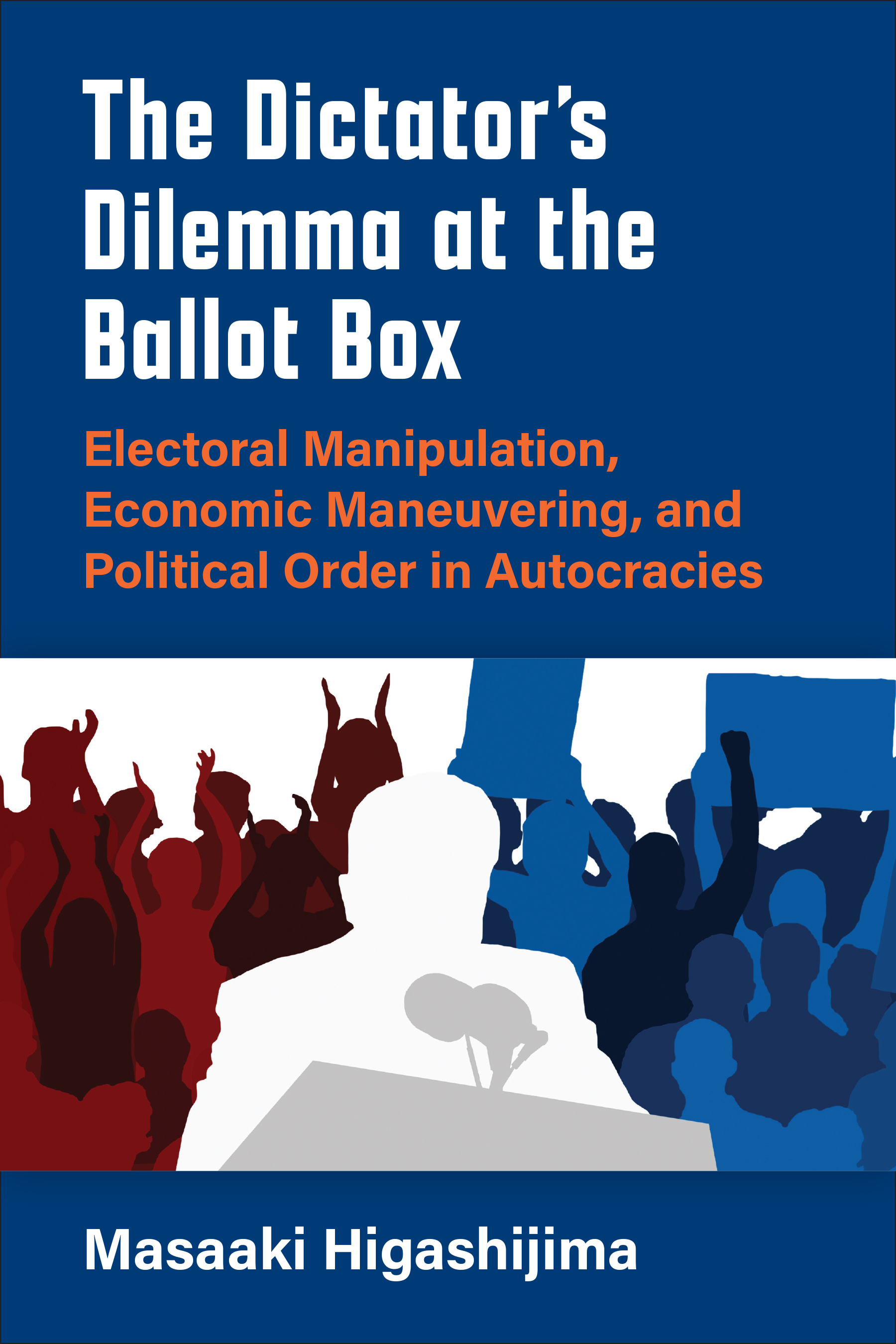
Title
Weiser Center for Emerging Democracies Series The Dictator’s Dilemma at the Ballot Box Electoral Manipulation, Economic Maneuvering, and Political Order in Autocracies
Size
Paperback
Language
English
Released
June, 2022
ISBN
9780472055319
Published by
University of Michigan Press
Book Info
See Book Availability at Library
Japanese Page
When we encounter terms such as dictatorships and authoritarian regimes, we often envision leaders ruling their nations through violence and repression, reminiscent of figures such as Hitler, Stalin and Mao Zedong. The infringement of human rights and civil liberties is also common in modern autocracies. However, it is crucial to recognize that today, many autocratic leaders maintain the facade of democracy by permitting opposition parties to participate in elections. In my book, I delve into the phenomenon of “autocracies disguising as democracies” by analyzing elections in modern autocratic states to shed light on this complex dynamic.
Dictators face a challenging dilemma in governing their countries solely through coercive means. In the contemporary world, where there is much more international scrutiny of their actions, relying on violence and repression incurs significant international costs. Moreover, domestically, coercion raises the stakes, making it difficult to secure substantial victories in elections. When citizens fear repression, they hesitate to express their opinions, hindering autocrats’ access to credible information crucial for efficient governance. Excessive repression can also fuel popular discontent, sparking anti-government collective actions that threaten autocratic stability. On the other hand, if autocrats opt for political reforms, such as minimizing electoral fraud and enhancing proportional representation, they risk losing their ability to secure overwhelming victories in elections. In essence, autocrats confront an electoral dilemma in dictatorships—a trade-off between the credibility of election results and the certainty of winning decisively in modern autocracies.
How do dictators navigate this electoral dilemma? My book delves into this question, both theoretically and empirically, shedding light on how autocrats strategically design elections in response to this dilemma and exploring the repercussions these designed elections can have on political stability. The book examines variations in electoral institutions, focusing on dictators’ ability to garner popular support through extensive economic distribution. When autocrats effectively provide material benefits to citizens, they can secure landslide victories in elections without resorting to blatant electoral fraud or the manipulation of electoral systems. However, if they fail to address this dilemma, elections can backfire on dictators, resulting in coups, popular protests, or surprising electoral successes by the opposition parties.
To evaluate these theoretical expectations empirically, the book combines comparative case studies of Kazakhstan and Kyrgyzstan in Central Asia with cross-national statistical analyses of post-World War II authoritarian regimes. Following the dissolution of the Soviet Union in 1991, the paths of these two Central Asian countries diverged, despite similar conditions at the time of their national independence. In Kazakhstan, President Nazarbayev successfully consolidated his regime until the late 2000s by conducting elections, whereas in Kyrgyzstan, President Akayev's regime faced destabilization due to elections, ultimately leading to the Tulip Revolution after the 2005 legislative elections. President Nazarbayev, benefiting from surging natural resource prices, bolstered his pork-barrel politics, allowing him to secure landslide victories in elections with minimal reliance on manipulation. In contrast, President Akayev, lacking resource advantages, had to resort to excessive electoral manipulation, triggering post-electoral political turmoil. The results from cross-national statistical analyses align with the findings of comparative case studies: Dictatorships efficiently distributing natural resource wealth to the grassroots through strong organizations tend to avoid blatant electoral fraud and adopt proportional representation systems that do not favor the ruling parties. The cross-national analysis also reveals that when autocrats fail to strike a balance between election manipulation and economic strategies, they face internal threats such as coups and external challenges such as protests and opposition election victories.
My book highlights a crucial paradox within modern dictatorships: Even in authoritarian regimes, political leaders must secure political legitimacy by winning the support of their citizens. Dictators employ elections strategically, carefully considering the power distribution within their nations; failure to do so jeopardizes autocratic stability. Despite the recent escalation in tensions between the “democracy” and “autocracy” camps, it might be tempting to view autocratic countries as inherently unique. However, my book proposes that dictators strategically govern their nations, emphasizing the need to grasp their rationale to gain deeper insights into politics within contemporary autocracies.
(Written by HIGASHIJIMA Masaaki, Associate Professor, Institute of Social Science / 2023)
Table of Contents
List of Tables
List of Abbreviations
Note on Translation and Transliteration
Preface
Acknowledgements
Part I Puzzles and Arguments
Chapter 1 Introduction
Chapter 2 A Theory of Autocratic Elections
Part II Cross-National Explorations
Chapter 3 Blatant Electoral Fraud
Chapter 4 Institutional Manipulation
Chapter 5 Economic Maneuvering
Chapter 6 Backfiring at the Ballot Box
Part III Comparative Case Studies
Chapter 7 From Electoral Manipulation to Economic Maneuvering: Nazarbaev’s Kazakhstan
Chapter 8 From Electoral Manipulation to Autocratic Breakdown: Akaev’s Kyrgyzstan
Chapter 9 Conclusion
References
Appendix
Related Info
The 44th IDE-JETRO Award for the Studies of Developing Countries, Institute of Developing Economies (JETRO 2023)
https://www.jetro.go.jp/news/releases/2023/36413dc9b6fbb287.html
The Ed A Hewett Book Prize (Honorable Mention, 2023), Association for Slavic, East European, and Eurasian Studies (2023 ASEEES PRIZE Sept 2023)
https://www.aseees.org/news-events/aseees-news-feed/2023-aseees-prize-winners-announced
Book Reviews:
Reviewed by Prof. Yujin Woo (Governance, Volume 36, Issue 2, p.673-675 Feb 26, 2023)
https://doi.org/10.1111/gove.12772
Author Exchange with Prof. Elvin Ong (Democracy & Autocracy, Vol. 21(1), p. 31-34 June 2023)
https://connect.apsanet.org/s35/wp-content/uploads/sites/26/2023/06/Democracy-and-Autocracy-211_June-2023.pdf
Reviewed by Prof. Fransisco Cantu (Japanese Journal of Political Science Dec 23, 2022)
https://www.cambridge.org/core/journals/japanese-journal-of-political-science/article/abs/dictators-dilemma-at-the-ballot-box-by-masaaki-higashijima-2022-university-of-michigan-press-book-reviews/5408BD299B33DA610C11BDDAE4F31CED
Reviewed by Prof. Michael K. Miller (Perspectives on Politics, Volume 21, Issue 2, pp. 669 – 673 Special Section: Green Political Science June 2023)
https://doi.org/10.1017/S1537592723000956
Essay:
Masaaki Higashijima. “Elections in Modern Dictatorships: Why Do Some Autocrats Tie Their Hands by Credible Elections?” (University of Michigan Press Blog July 19, 2022)
https://press.umich.edu/Blog/2022/07/Elections-in-Modern-Dictatorships-Why-Do-Some-Autocrats-Tie-Their-Hands-by-Credible-Elections



 Find a book
Find a book


 eBook
eBook